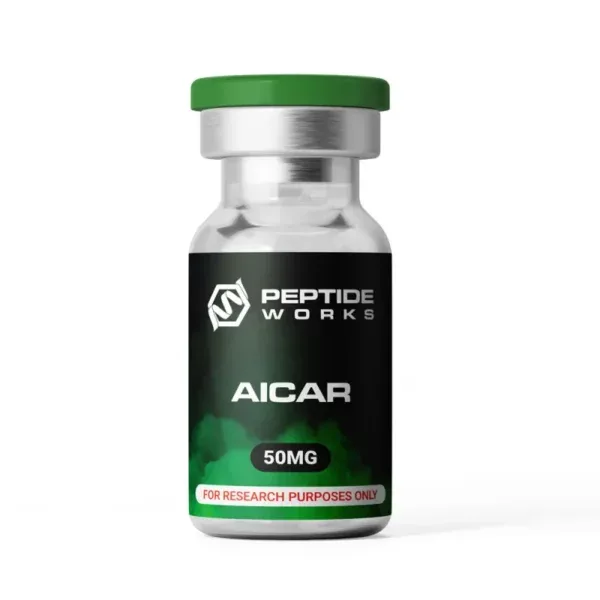
PROMO!
First order? Get 10% OFF with this code: 1storder
Written by

AICAR peptide shows promising test results in research for boosting endurance performance. This compound works by activating specific pathways in cells that help with energy production and metabolism and regulating inflammatory responses.
Researchers have found that AICAR can trigger the same effects as resistance exercise training in research lab settings. Clinical studies indicate that this peptide may help cells use glucose and fatty acids more efficiently, improving insulin sensitivity and overall energy balance.
Many studies focus on how AICAR peptide affects skeletal muscle function and stamina. However, these findings come from research environments only. All peptides sold by Peptide Works are strictly for research purposes only, not for human use.
Discover AICAR Peptide from Peptide Works an analog of adenosine monophosphate that supports smooth muscle energy and muscle contraction in male mice.

AICAR peptide targets cellular energy pathways through AMPK activation. When cells receive AICAR, they begin producing more mitochondria, which are the power plants of cells.
This process helps tissues create energy more effectively during physical activity and metabolic stress. Research shows that AICAR can boost glucose uptake in skeletal muscle cells without insulin.
The peptide also increases fatty acid oxidation, giving cells multiple fuel sources. Studies indicate that these energy changes happen within hours of AICAR administration.
Scientists observe improved energy metabolism and cellular efficiency that mimics long-term resistance exercise adaptations in laboratory conditions.
AMPK activation helps cells change like they do with endurance training, but without exercise. When AICAR peptide activates AMPK, it triggers PGC-1α phosphorylation at certain spots.
This process is like what happens during endurance training. Research shows AMPK adds phosphate groups to PGC-1α protein at Thr177 and Ser538, which helps make new mitochondria.
Studies show AMPK activation can increase muscle insulin sensitivity and glucose uptake, just like after exercise. The changes from AICAR peptide research include better mitochondrial quality and improved muscle function.
Peptide Works provides these research compounds to help scientists study these exercise-like cellular pathways.
Mitochondrial biogenesis involves specific molecular cascades that reshape cellular architecture. AICAR peptide research shows increased expression of mitochondrial transcription factor A (TFAM) and nuclear respiratory factors.
These transcription factors coordinate nuclear and mitochondrial DNA synthesis for new organelle production. Studies reveal enhanced cristae formation and improved respiratory chain complex assembly, contributing to better oxidative stress resistance.
Research indicates that AMPK activation upregulates SIRT1 deacetylase activity, which further enhances PGC-1α function. This creates a positive feedback loop for sustained mitochondrial expansion and energy optimization.
Scientists observe increased mitochondrial volume density, protein synthesis, and improved oxidative enzyme activity within several days of treatment. Activators like AICAR demonstrate remarkable cellular remodeling capacity in controlled laboratory environments.
Explore AMPK Peptide from Peptide Works, a research peptide that mimics an analog of adenosine to support protein expression and energy metabolism.

Enhanced oxidative enzymes help cells switch fuel sources better. AICAR studies show increased citrate synthase and cytochrome c oxidase activity. This helps cells use glucose and fat more efficiently.
These improvements let tissues change fuel use during exercise and stress. AICAR also boosts fat burning in muscle cells.
These peptides activate enzymes that increase ATP production from many fuels. This helps muscles work longer and lowers inflammation and oxidative stress.
Researchers use pure peptides from trusted suppliers to study these effects and fight metabolic diseases like obesity and heart disease.
Metabolic flexibility helps cells keep working well during long activity by switching between glucose and fat use. This switching stops energy loss when one fuel runs low and helps maintain overall energy balance.
Research shows cells change energy use based on fuel and stress levels. This keeps ATP production steady and avoids energy blocks. Improved insulin sensitivity and reduced insulin resistance are observed in multiple previous studies.
AICAR peptide studies find better metabolic flexibility helps cells last longer and use fuel well. Cells with this flexibility have more muscle mass, less fatigue, and improved muscle function during prolonged activity.
This process keeps energy flowing for long cell work, which is key for endurance research applications, muscle growth, and resistance exercise and is closely linked to AMPK’s role in heart health.
AICAR peptide investigation points to exciting new discoveries in many scientific fields. Scientists present study on AICAR for heart health, focusing on protecting heart muscle and improving blood vessel function.
Cancer cells react differently to AICAR, as it changes cell cycle control and energy use compared to normal cells. This may help develop targeted cancer treatments.
Aging research is another area of interest. Studies look at how AMPK pathways might help cells live longer and reduce damage from oxidative stress and inflammation.
Advanced delivery methods are being developed to improve AICAR bioavailability and target specific adipose tissue and skeletal muscle more effectively.
Future studies may combine AICAR with other exercise-like peptides or energy signal mimics for stronger effects. These could help treat metabolic problems like obesity and heart disease.
These studies could change how we understand cell energy use, protein production, and lipid metabolism in labs.
All products discussed are supplied for research purposes only and are not intended for human use.
References
[1] Guerrieri D, van Praag H. Exercise-mimetic AICAR transiently benefits brain function. Oncotarget. 2015 Jul 30;6(21):18293-313.
[2] Kobilo T, Guerrieri D, Zhang Y, Collica SC, Becker KG, van Praag H. AMPK agonist AICAR improves cognition and motor coordination in young and aged mice. Learn Mem. 2014 Jan 17;21(2):119-26.
[3] Višnjić D, Lalić H, Dembitz V, Tomić B, Smoljo T. AICAr, a Widely Used AMPK Activator with Important AMPK-Independent Effects: A Systematic Review. Cells. 2021 May 4;10(5):1095.
[4] Reznick RM, Shulman GI. The role of AMP-activated protein kinase in mitochondrial biogenesis. J Physiol. 2006 Jul 1;574(Pt 1):33-9.
[5] Drake JC, Alway SE, Hollander JM, Williamson DL. AICAR treatment for 14 days normalizes obesity-induced dysregulation of TORC1 signaling and translational capacity in fasted skeletal muscle. Am J Physiol Regul Integr Comp Physiol. 2010 Dec;299(6):R1546-54.
ALL CONTENT AND PRODUCT INFORMATION AVAILABLE ON THIS WEBSITE IS FOR EDUCATIONAL PURPOSES ONLY.
DISCLAIMER: These products are intended solely as a research chemical only. This classification allows for their use only for research development and laboratory studies. The information available on our Peptide Works website: https://peptide-works.com/ is provided for educational purposes only. These products are not for human or animal use or consumption in any manner. Handling of these products should be limited to suitably qualified professionals. They are not to be classified as a drug, food, cosmetic, or medicinal product and must not be mislabelled or used as such.
Peptide Works
Related Articles

Best Peptides for Women in Perimenopause: From Libido to Energy
Do you feel drained, struggle with focus, or notice your drive slipping during perimenopause? These common symptoms can feel frustrating.

What Is The Best Myostatin Inhibitor For Muscle Growth?
Finding the best myostatin inhibitor involves examining compounds that block muscle growth limits in lab studies. The crucial role of

Regulating Blood Sugar Levels with Mots-C
Maintaining steady glucose supports sharp focus, constant energy, and leaner body-composition outcomes in laboratory settings. Among the emerging tools for